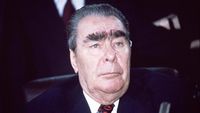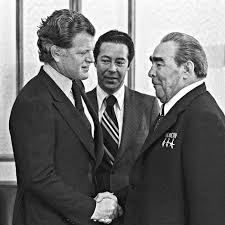Difference between revisions of "Leonid Brezhnev"
(→General Secretary) |
(→References) |
||
| Line 37: | Line 37: | ||
[[Category:Soviet Leaders]] | [[Category:Soviet Leaders]] | ||
| + | [[Category:Statesmen]] | ||
Latest revision as of 02:58, March 17, 2024

Brezhnev had a stroke in March 1982 and died of a heart attack in November.[1]
Leonid Brezhnev (1906 - 1982) was part of an internal coup that stripped the Soviet Union's leader, Nikita Khrushchev, of power in 1964 because of Khruschev's reform efforts. Brezhnev became the new head of the Soviet Union and remained so until his death in 1982.[2]
Brezhnev's ethnicity was listed as Ukrainian in official Soviet documents.[3][4][5]
Contents
Background
Brezhnev was born on December 19, 1906 in Kamenskoye, now Kamianske, Ukraine.
Brezhnev's admiration for Western culture, especially music, was well-known.
World War II
When the Germans occupied Ukraine in 1942, Brezhnev was sent to the Caucasus as deputy head of political administration of the Transcaucasian Front. In April 1943 he became head of the Political Department of the 18th Army. Later that year, the 18th Army became part of the 1st Ukrainian Front, as the Red Army regained the initiative and advanced westward through Ukraine. The Front's senior political commissar was Nikita Khrushchev, who had supported Brezhnev's career since the prewar years. Brezhnev had met Khrushchev in 1931, shortly after joining the Party, and as he continued his rise through the ranks, he became Khrushchev's protégé. At the end of the war in Europe, Brezhnev was chief political commissar of the 4th Ukrainian Front, which entered Prague in May 1945, after the German surrender.
General Secretary
Brezhnev initially continued Khruschev's policy of peaceful co-existence and joined with U.S. President Richard Nixon in detente while continuing active support for armed national liberation movements around the world. At the start of the detente agreement, Nixon and Brezhnev agreed to allow each other to address the other's people on a nationally televised broadcast.[6]
In 1980 the Soviet Politburo presided over by Brezhnev initiated the Soviet-Afghan War in an effort to create a Soviet Socialist Republic of Afghanistan along atheist and secular models, subservient to the Soviet Union as another satellite-client state.

Brezhnev was the original author and planner of the nuclear freeze movement which became quite popular and fashionable in the West among liberals such as Ted Kennedy and Barack Obama because of its anti-NATO, anti-U.S. military spending and pro-socialist welfare stance.
Brezhnev Doctrine
In 1968 elements of the Communist Party of Czechoslovakia rapidly began to reform their rule, loosen censorship, and strengthen Western ties. In response, Soviet and other Warsaw Pact troops entered Czechoslovakia and installed a new regime. Brezhnev announced, "Now the situation in brotherly Czechoslovakia is completely normalized." Out of these events arose the so-called Brezhnev Doctrine, which warned that the Soviet Union would act to maintain its hegemony in Eastern Europe. Soviet suppression of the reform movement reduced blatant gestures of defiance on the part of Romania and served as a threatening example to the Polish Solidarity trade union movement in 1980. But it also helped disillusion communist parties in Western Europe to the extent that by 1977 most of the leading parties embraced Eurocommunism, which freed them to pursue political programs independent of Moscow's dictates.
Later years and death
The Brezhnev years are known as the Era of Stagnation and marked by rampant corruption. He was reported to have died in 1978, but Soviet doctors resuscitated him and his cognitive abilities never quite returned. In his final years, as his mental faculties failed, a common joke circulated about him and his chief-of-staff Konstantin Chernenko: "Brezhnev is dead, only Chernenko hasn't informed him yet." He died November 10, 1982 and was succeeded by Yuri Andropov for 15 months until Andropov, who then was succeeded by Chernenko for 13 months until Chernenko died, who then was succeed by Mikhail Gorbachev for six years until the Soviet Union died.
References
- ↑ http://www.u-s-history.com/pages/h1883.html
- ↑ The New American Desk Encyclopedia, Penguin Group, 1989
- ↑ L.I. Brezhnev military card
- ↑ http://commons.wikimedia.org/wiki/File:Brezhnev_LI_OrKrZn_NagrList_1942.jpg
- ↑ http://commons.wikimedia.org/wiki/File:Brezhnev_LI_Pasport_1947.jpg
- ↑ https://youtu.be/FeYhd6uNMpo?t=2386
- ↑ https://spectator.org/the-kremlins-dupe-ted-kennedys-russia-romance/
